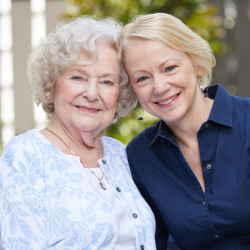SOCIAL CARE FUNDING
When planning long-term care and support for a loved one, it is sensible to start thinking about your financing care options as soon as it is practically possible.
At Prestige Nursing & Care, we have helped families up and down the country understand how they can finance care, whether through funding available to them or financing initiatives that can contribute to the cost of care.
If you need care and support for day-to-day tasks and activities that enable you to maintain independence, you may be entitled to social care funding to get the help you need. If you are living with a complex care need and require nurse-led care, it is worth exploring whether you are entitled to any healthcare funding first, as this could considerably contribute to the overall cost of care.
Here we explain all you need to know about your health and social care funding options.
WHAT IS SOCIAL CARE FUNDING IN ENGLAND?
Social care funding is means tested and allocated by your local authority. The level of funding you might be entitled to depends on your financial circumstances and your care and support needs. Social care funding is provided to people to help them with everyday activities and tasks. If you need help with feeding, continence management, washing or dressing, you could be entitled to social care funding if you stay within the financial threshold level in the means test.
WHAT IS SOCIAL CARE FUNDING IN SCOTLAND?
Unlike in England, if you live in Scotland, funding for personal care is available to everyone who is assessed as needing it. Your income, capital assets, marital or civil partner status do not impact your ability to access this funding from your local authority. An assessment for funding in Scotland will look at your needs relating to personal hygiene, continence management, food and diet, problems with mobility, counselling and support and nursing, including clinical interventions required.
If you require daily support with housework, laundry and shopping, activities outside the home, or providing food then these may well be chargeable and will be subject to a means test assessment, which looks at your income when assessing the funding available.
OUR WORK WITH LOCAL AUTHORITIES
At Prestige Nursing & Care, we have developed strong relationships with many social services case managers based on a shared goal of securing the right funded care package for clients so that they get the right care, at the right time, for all of life. We collaborate to ensure that the care and support provided evolve with changing needs. Throughout the process, we engage with our client and their family so everyone is involved in making sure our clients can live a meaningful and fulfilled life with independence whilst their family gets all the support they need.
WILL SOCIAL SERVICES FUND LIVE-IN CARE OR VISITING CARE?
THE CARE ACT
The Care Act 2014 is the piece of legislation that sets the rules for council funding. It is the law that governs the rules that local councils must follow when assessing your care needs and determining whether you are eligible for social care funding.
Before the Care Act, the laws governing the various care entitlements people had were spread out amongst several different different pieces of legislation. This created a complex and confusing system that was difficult to navigate.
The Care Act has simplified the process and made it much easier to understand whether you are entitled to publicly funded care. It also makes it easier to understand your rights should you ever have to challenge any decisions you believe to be wrong.
THE CARE NEEDS ASSESSMENT
There are a series of steps required to determine if you are eligible for social care funding, the first of which is the care needs assessment. This assessment is carried out by your local council and it is used to determine if you are eligible for the council to pay towards the cost of your care. This assessment is free and anyone can ask for one.
During your needs assessment, a trained professional from your local council such as a nurse or social worker will visit you at your home or in hospital to carry out your assessment. You may also be offered an assessment over the phone or online, although we suggest requesting an in-person assessment whenever possible.
You will be asked questions about your care needs and how you cope with many day-to-day tasks such as food preparation, mobility or personal care. Before your assessment takes place, think about the areas of your life in which you feel you could use extra care and support.
You can request an assessment by contacting your local council by telephone, in writing or online. Each council is different, so contact your own to learn more about their application process. If it is determined you do need care, you will need to undergo an additional financial assessment (means test) to work out if you will have to contribute to the cost of your own care.

SOCIAL CARE FUNDING MEANS TESTING
Means testing is how your financial eligibility to receive funding for your care is assessed. The outcome of the means test will determine how much social care funding you are eligible to receive.
Your local authority will look at your income, savings, and property to determine how much you need to contribute to the cost of your care. If you are receiving care in your own home, then the means test will not consider the value of your property. However, if you move permanently into a care home, the means test may include the value of your property, which may reduce the level of funding available to you.
If you are moving into a care home, your home will not be included in the means test if you home remains occupied by:
- Your partner or spouse
- A close relative who is either over the age of sixty or incapacitated
- A relative younger than sixteen whom you are legally obliged to support
- An ex-partner if they are deemed a single parent
Below is an example of how the means test is applied in England.
| Capital | Costs to be met by you |
| £23,250+ | You will need to meet the full cost of your care and support |
| Between £14,250-£23,250 | The local authority will fund part of your care and support, you will need to meet the rest. |
| Less than £14,250 | Full social care funding will be provided. |
Social care reforms in England 2025 – what they mean for you
In 2025, significant social care reforms are expected to come into effect that will change how adults in England pay for care fees. A major aspect of these reforms is the introduction of an £86,000 lifetime cap on personal care expenses. This cap means that individuals funding their own care will not pay more than £86,000 for personal care, including home care services, throughout their lifetime.
Additionally, the new rules will adjust the financial thresholds for care funding. Starting from October 2025, the lower threshold for local authority funding will rise from £14,250 to £20,000, and the upper threshold will increase from £23,250 to £100,000. This means that individuals with savings and income below £20,000 will receive full funding, while those with assets between £20,000 and £100,000 will contribute to their care costs on a sliding scale.
These changes aim to provide more support and reduce the financial burden on those needing care. However, accommodation and other living costs will not be covered by the care cap. It’s essential to plan ahead and understand these new rules to make informed decisions about future care needs.
For more detailed guidance and to discuss how these changes might affect you or your loved ones, contact our expert care advisors at Prestige Nursing & Care.
| Aspect | Current Rule | New Rule (From Oct 2025) |
| Lower Threshold for Funding | £14,250 | £20,000 |
| Upper Threshold for Funding | £23,250 | £100,000 |
| Lifetime Care Cap on Personal Care Costs | None | £86,000 |
HOW IS SOCIAL CARE FUNDED IN THE UK?
PERSONAL HEALTH BUDGETS
If you are an adult eligible for social care funding, you will be offered the choice of receiving your funding through a personal health budget (PHB). The purpose of a PHB is to give those living with long-term health conditions and disabilities choice and control over how their funding is spent on their health and well-being needs.
Your local authority provides social care funding and there are options as to how you manage your funding and care arrangements:
Direct payments
Your local authority provides social care funding and there are options as to how you manage your funding and care arrangements:
You or your representative receives the funding directly to procure and manage the care, support and services you need. Whilst there are procedures to follow and guidance governing how it is spent, this gives you more freedom and control to decide what is best for you. You must provide evidence of how the direct payments have been spent.
Third-party personal health budget
An independent organisation, such as a lawyer, will hold the funding on your behalf and arrange and pay for the care and support you need as identified in a plan of care.
Notional personal health budget
Your local authority or your NHS team will manage the funding available to you based on your assessed needs. They will arrange the care and support you need, including choosing the care provider, and pay for the care directly, which means you do not get any funding directly.
If you manage your own personal budget, you will be free to choose the provider you wish to receive care from, whereas if the local authority manages it through your social services team, you will be restricted to using a provider from their preferred supplier list. However, you can be rest assured that the care providers on the social services approved suppliers list will have gone through rigorous checks for safety and compliance.

ACCESSING SOCIAL CARE FUNDING IN ENGLAND
There are a series of steps involved in securing social care funding.
- Firstly, speak to your GP. If they feel you are eligible, they will refer you to your local authority.
- The adult services team at your local authority will then arrange for an assessment of your care needs.
- A report is produced defining your assessed care and health needs.
- A financial assessment (means test) will be conducted to determine your ability to pay the cost of the care you need. All your personal assets, liquid and fixed are considered in the process.
- The results of the means test will determine whether you are eligible for part of full social care funding or whether you will need to self-fund the care you need.
ACCESSING SOCIAL CARE FUNDING IN SCOTLAND
In Scotland, you can access social care funding by taking the following steps:
- The first step is to contact your local authority social services team to arrange an assessment.
- The social services team will then arrange to assess your care needs.
- A report is produced defining your assessed care and health needs.
- If you are assessed as needing personal care or nursing care, this will be funded by the local authority, however, the cost of any other care and support needs may need to be funded by you.
Arranging for Home Care
If you are eligible for social care funding or already have social care funding, we can provide impartial support and guidance on how to arrange home care for yourself or a loved one.
The personal budget you receive will show how much the council is paying towards your care. This may be enough to cover some or all of the cost of receiving care in your own home. We can provide a care package that is tailored to your unique care needs and preferences while also considering your budget and future care costs.
Do not hesitate to call one of our friendly care experts to discuss the next steps in arranging quality care at home.

GOVERNMENT FUNDING
You may also find that you are eligible to access the following Government funding.
Disability Living Allowance (DLA) for children
If you have a child under the age of 16 who has complex care needs and requires more support from you than a child without a disability, you may be eligible to claim DLA in England. In Scotland, you can apply for the Child Disability Payment.
Disability Living Allowance (DLA) for adults
in England. In Scotland, you can apply for the Child Disability Payment.Personal Independence Payment (PIP) is replacing DLA for adults over 16 with disabilities or long-term conditions in England. It is available to adults until the state pension age. In Scotland, adults need to apply for the Adult Disability Payment.
Attendance Allowance
The Attendance Allowance benefit is for people of state pension age or older who require care and support or have a disability and need a family member to look after them regularly.
Employment and Support Allowance (ESA)
If you cannot work due to long-term illness or disability, you may be entitled to Employment and Support Allowance (ESA). ESA can help with living costs if you are unable to work and can provide support to help you return to work if you are able.
HOME ADAPTATION FUNDING
You may be entitled to funding if your home requires minor adaptations to make it more suitable for your care. Most local authorities offer up to £1,500 for minor adaptations such as installing lever taps or handrails around the home. This funding is available as long as your local authority has assessed you as qualifying for home adaptations. For major adaptations, Disabled Facilities Grants are available for up to £30,000 in England if you meet the eligibility criteria. However, it is important to note that the Disabled Facilities Grant is not available in Scotland.
SOCIAL CARE FUNDING RESOURCES
If you require independent information and care funding advice about your home care funding options, there are a number of charities and advisory services that can provide you with valuable care funding guidance, including:











